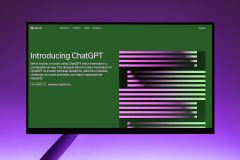In the relatively short history of the internet, the consumption of online information has increased worldwide at a breakneck pace. From text-only blogs, to Wikipedia, to complete online college courses, content creators and publishers have evolved to meet the ever-changing needs of their audiences through innovation.
Reading educational material is no longer restricted to outdated words on a screen or expensive hard copy publications. The latest online education trends include direct interaction between authors and readers, regular updates in fast-changing fields, and integrated informational delivery methods through apps and varied media.
The Rise of the Immersive Experience
Online content has historically been segregated by media type with a hard barrier between educators and students. With more people seeking education both inside and outside the traditional post-secondary education system, demands for better innovation with more interactive and expert-lead reading experience have inspired online publications to adapt.
Authors are seeing the benefit of this preference, too. Soundarya Balasubramani, author of Admitted: The Proven Guide To Get Into Your Dream University and Study Abroad, chose to publish her book’s second edition on Holloway to provide higher engagement with her readers. Rather than a traditional publishing arrangement where buyers purchase only an e-book, Holloway’s platform allows Soundarya to include an invitation to the book’s integrated Slack channel. Additionally, instant updates to the text, and other items such as access to additional resources and future webinars.
This comprehensive approach to publishing provides greater overall value. In addition, it also allows individuals who purchase the book to connect with each other and engage in community-based learning. Integrating audio, video, and web graphics into the online publications is easier than ever. Because of this, students can interact with the material in whatever way they most effectively process information.
Innovations in Online Publication
With online publication, there is also a greater potential for innovation through better organization and personalization. While she heads a successful blog and YouTube channel in addition to an in-demand online course on productivity and mindful planning, Soundarya recognizes the limitations of those platforms when it comes to students making the material their own. Soundarya was especially interested in the potential for buyers to provide feedback to her on the material. She was also excited for them to create their own notes within the text as they read; notes can even be shared with other individuals who purchased the book. This kind of collaborative reading experience is becoming more prevalent and expected in the online community.
The biggest companies in online publishing tend to be very secretive about purchasing and reader usage data. Newer publishing platforms have taken note of this and offer authors valuable feedback by utilizing and sharing data analytics. Data can be compiled as to which sections of the text are receiving attention from readers. For example, Soundarya mentioned some online reading sites such as Goodreads offer the useful feature of noting how many people might highlight the same section of text. Other sites have more robust analytics and can let the author know who is reading which sections. They can also show authors how readers are interacting with the information.
Unbundling Information
Preference for a more comprehensive approach to reading and information intake is not the only trend taking place in online reading preferences. Publishers have found it beneficial to adapt to individuals looking for specific pieces or categories of information within a larger resource. This is typically referred to as “unbundling.”
Unbundling within the realm of education or reading can take multiple forms. Students might be interested in taking one course in a particular program rather than pursuing an entire degree or certification. A single book within a series might hold greater interest because it addresses an informational subset. Even a single book might not be read front to back. If that is the case, readers need to be able to quickly find the exact information they’re looking for. They should be able to find it within the larger piece.
In response to these unbundling preferences, online publishers have begun to offer higher quality search functions and other options. For example, Soundarya’s publication contains a search bar where you can ask questions to the book by typing in keywords. This will then bring up a host of pre-populated questions along with the sections where they were answered. Consequently, this allows readers the ability to seek their wanted information much quicker. And, they can do so while having no expectation of reading the piece in its entirety.
The Shift From Paper To Online Continues, Both in Preference and Prestige
In the past, traditional publication was seen as the only reputable course of action for instructors. And, online publication was relegated to unreliable so-called “experts,” and those who were incapable of achieving higher-level recognition. As more credentialed and expert instructors like Soundarya — a distinguished keynote speaker, in-demand Maven.com instructor, and Columbia University graduate — move away from paper publishing and toward interactive online reading platforms, the field is likely to see continued growth and innovation in the coming years.
The change in preferences for the population to conduct more of their reading online was well on its way even before the COVID-19 pandemic caused that shift to become more pronounced. As it is likely more education will be conducted online in the future, publishers and other educational content creators will continue to gauge how students absorb information and continue to innovate in order to meet those needs.
Image credit: Vlada Karpovich; Pexels; Thanks!


























